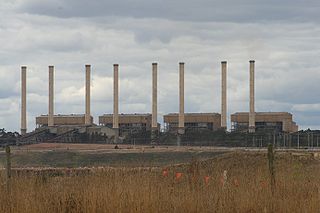Related Research Articles

The Royal County of Berkshire, more commonly known as simply Berkshire, is a ceremonial county in South East England. It is bordered by Oxfordshire to the north and the north-west, Buckinghamshire to the north-east, Greater London to the east, Surrey to the southeast, Hampshire to the south and the south-west, and Wiltshire to the west. Reading is the largest settlement and the county town.

Battersea Power Station is a decommissioned coal-fired power station, located on the south bank of the River Thames, in Nine Elms, Battersea, in the London Borough of Wandsworth. It was built by the London Power Company (LPC) to the design of Leonard Pearce, Engineer in Chief to the LPC, and CS Allott & Son Engineers. The architects were J. Theo Halliday and Giles Gilbert Scott. The station is one of the world's largest brick buildings and notable for its original, Art Deco interior fittings and decor.

Drax power station is a large biomass power station in Drax, North Yorkshire, England, capable of co-firing petroleum coke. It has a 2.6 GW capacity for biomass and 1.29 GW capacity for coal. Its name comes from the nearby village of Drax. It is situated on the River Ouse between Selby and Goole. Its generating capacity of 3,906 megawatts (MW) is the highest of any power station in the United Kingdom, providing about 6% of the United Kingdom's electricity supply.

Bishop Auckland is a market town and civil parish at the confluence of the River Wear and the River Gaunless in County Durham, England. It is 12 miles (19 km) northwest of Darlington and 12 miles (19 km) southwest of Durham.
The Mischief Makers are a group of activists and artists based in Nottingham, UK, who formed early 2005 as a creative response to the G8 Summit, held at Gleneagles Hotel, Scotland, in July that year. The collective uses creativity to support community, environmental and social justice campaigns, and activist groups. The group's aim is "to inspire people and empower them to identify challenges and take action in their local environment".

The Hazelwood Power Station was a decommissioned brown coal-fuelled thermal power station located in the Latrobe Valley of Victoria, Australia. Built between 1964 and 1971, the 1,600-megawatt-capacity power station was made up of eight 200MW units, and supplied up to 25% of Victoria's base load electricity and more than 5% of Australia's total electricity demand. It was a 'subcritical' pulverized coal-fired boiler. The station was listed as the least carbon efficient power station in the OECD in a 2005 report by WWF Australia, making it one of the most polluting power stations in the world. At 1.56 tonnes of CO2 for each megawatt hour of electricity, it was 50% more polluting than the average black coal power station in New South Wales or Queensland. Hazelwood emitted 14% of Victoria's annual greenhouse gas emissions and 3% of Australia's greenhouse gas emissions.

Ratcliffe-on-Soar Power Station is a coal-fired power station owned and operated by Uniper at Ratcliffe-on-Soar in Nottinghamshire, England. Commissioned in 1968 by the Central Electricity Generating Board, the station has a capacity of 2,000 MW. As of September 2023, it is the only coal-fired power station left in the UK, and is scheduled to close in September 2024.

Didcot power station is an active natural gas power plant that supplies the National Grid. A combined coal and oil power plant, Didcot A, was the first station on the site which opened in 1970 and was demolished between 2014 and 2020. The power station is situated in Sutton Courtenay, near Didcot in Oxfordshire, England. Additionally Didcot OCGT is a gas-oil power plant, originally part of Didcot A and now independent that continues to provide emergency backup power for the National Grid.

The Camps for Climate Action are campaign gatherings that take place to draw attention to, and act as a base for direct action against, major carbon emitters, as well as to develop ways to create a zero-carbon society. Camps are run on broadly anarchist principles – free to attend, supported by donations and with input from everyone in the community for the day-to-day operation of the camp. Initiated in the UK, camps have taken place in England at Drax power station, Heathrow Airport, Kingsnorth power station in Kent, the City of London and The Royal Bank of Scotland Headquarters, near Edinburgh. During 2009 camps also took place in Canada, Denmark, France, Ireland, Netherlands/Belgium, Scotland, Wales and Australia.

Drax Group PLC is a power generation business. The principal downstream enterprises are based in the UK and include Drax Power Limited, which runs the biomass fuelled Drax power station, near Selby in North Yorkshire. The Group also runs an international biomass supply chain business. The company is listed on the London Stock Exchange and is a constituent of the FTSE 250 Index.

Friends of the Earth Scotland is a Scottish charity and an independent member of the Friends of the Earth International network of 73 environmental organisations. It is one of the 30 national organisations that Friends of the Earth Europe represents and unites at the European level.
Leila Deen is a British environmental activist, campaigning on the issues of climate change, poverty and water politics. She is program director at SumOfUs in Washington, DC. Previously, she led Greenpeace UK's campaign against fracking and was projects director with Greenpeace USA until 2019. She was previously an activist with the World Development Movement and Plane Stupid. She is most widely known for pouring green custard on the then Business Secretary Lord Mandelson in March 2009 in protest against the extension of Heathrow Airport, for which she was arrested and cautioned.
Climate Rush is a UK organisation that campaigns on various environmental issues related to climate change. Their website states that, "We are a diverse group of women and men who are determined to raise awareness of the biggest threat facing humanity today - that of Climate Change". The organisation was founded in October 2008 by a group of eleven women, including Tamsin Omond. They have organised various protests using direct action to highlight their cause. They model their actions on those of the suffragettes who campaigned a century ago to gain women the right to vote. Members of the Women's Institute have campaigned alongside members of the organisation.
Climate Ground Zero (CGZ), founded in February 2009, is a non-violent civil disobedience campaign against mountaintop removal mining based in the southern coalfields of West Virginia. According to their website, Climate Ground Zero believes “that the irrevocable destruction of the mountains of Appalachia and its accompanying toll on the air, water, and lives of Appalachians necessitates continued and direct action". The organization seeks to end mountaintop removal mining by drawing attention to the issue through protests involving trespass on the property of mining companies. By locking down to machinery on mine sites, occupying trees in the blast zone, or blockading haul roads to mine sites, protesters associated with Climate Ground Zero directly interfere with mining practices. Other protests draw attention to the alleged negligence of regulatory agencies such as the West Virginia Department of Environmental Protection (WVDEP) or the federal Environmental Protection Agency (EPA) by occupying the offices of these governmental organizations. Climate Ground Zero has been referenced in the New York Times, Los Angeles Times, Washington Post, Democracy Now, and the Associated Press.

The Occupy movement hand signals are a group of hand signals used by Occupy movement protesters to negotiate a consensus. Hand signals are used instead of conventional audible signals, like applause, shouts, or booing, because they do not interrupt the speaker using the human microphone, a system where the front of the crowd repeats the speaker so that the content can be heard at the back of the crowd. The signals have been compared to other hand languages used by soldiers, cliques and Wall Street traders.
Mountain Justice is a grassroots movement established in 2005 to raise worldwide awareness of mountaintop removal mining and its effects on the environment and peoples of Appalachia. The group seeks to encourage conservation, efficiency, solar and wind energy as alternatives to all forms of surface mining. It self-describes as "a regional Appalachian network committed to ending mountaintop removal". It seeks justice because the mountaintop removal (MTR) it opposes is a form of coal mining known as mountaintop removal mining which produces coal sludge toxic waste which is stored in a dam on the mountain and leaches into the groundwater, which poisons the environment, which defaces the top of the mountain, and which is not stopped due to political corruption.
Extinction Rebellion (XR) is an international "non-violent civil disobedience" movement carrying out demonstrations worldwide to highlight governments' inaction on climate change. Since 2018, Extinction Rebellion has taken a variety of actions in Europe, the US, and rapidly elsewhere in the world, to urge political and economic forces to take action amid the climate crisis. Although, their non-violent disobedience protests are an effort to generate attention around environmental issues, XR activists have become known for civil disobedience and disruptive tactics.
Farhana Yamin is a British lawyer, public speaker and climate activist.

Impossible Rebellion was a series of nonviolent climate change protests in the United Kingdom organised by Extinction Rebellion (XR), from 23 August 2021 to 4 September 2021. The protests particularly targeted the City of London to raise awareness of the role of the financial sector in climate change. Protesters during the Impossible Rebellion demanded that the UK government cease new investments in the fossil fuel industry. XR also demand that the government declare a climate emergency, reach net zero carbon emissions by 2025 and create a citizens' assembly on climate change.

Just Stop Oil is a British environmental activist group. Using civil resistance, direct action, vandalism and traffic obstruction, the group aims for the British government to commit to ending new fossil fuel licensing and production. The group was founded in February 2022 and began protesting at English oil terminals in April 2022. The group has gained both criticism and approval of its methods of activism.
References
- ↑ "Student handcuffed after throwing water to protestor wins compensation". The Daily Telegraph . 11 November 2008.
- ↑ "Coal protest team glued to doors". BBC News . 11 August 2008.
- ↑ "Climate protest targets engineers". BBC News. 5 June 2009.